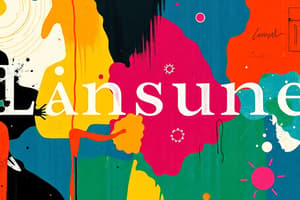Podcast
Questions and Answers
What is an example of zeugma?
What is an example of zeugma?
- The flowers danced in the breeze.
- He lost his keys and his temper. (correct)
- The pen of the author is mightier than the sword.
- She felt the excitement and fear of the moment.
Which statement best describes metonymy?
Which statement best describes metonymy?
- Making a direct comparison between two different things.
- Referring to a concept by the name of something closely related. (correct)
- Using an object to represent an idea.
- Giving human traits to non-human things.
Identify an example of paradox.
Identify an example of paradox.
- The room was deafeningly silent.
- She ran as fast as lightning.
- He is a terrible chef who makes delicious meals.
- The sound of silence. (correct)
What defines an antimetabole?
What defines an antimetabole?
Which of the following is a definition of hyperbole?
Which of the following is a definition of hyperbole?
What characterizes imagery in language?
What characterizes imagery in language?
Which option is the best example of personification?
Which option is the best example of personification?
What does irony refer to in rhetorical terms?
What does irony refer to in rhetorical terms?
Flashcards
Zeugma
Zeugma
The use of a single verb to modify two or more words with different senses or levels of literalism
Metonymy
Metonymy
A figure of speech in which some thing or concept or idea is referred to by the name of something very closely related with that thing or concept or idea.
Synecdoche
Synecdoche
Describing part of an object while actually meaning or representing the whole; i.e. the part for the whole; A sub-type of metonymy
Simile
Simile
A FoS comparing one thing to another using like or as.
Signup and view all the flashcards
Metaphor
Metaphor
a figure of speech used to describe something in a way that isn't literally true, or drawing a direct, non-literal comparison to describe something or make a point
Signup and view all the flashcards
Personification
Personification
A Figure of Speech giving a nonhuman thing human qualities/feelings
Signup and view all the flashcards
Paradox
Paradox
a statement that seems to go against common sense but may still be true.
Signup and view all the flashcards
Oxymoron
Oxymoron
Two or more words in a sentence that mean the opposite, or seem to be opposite; Separate from juxtaposition and paradox
Signup and view all the flashcardsStudy Notes
Rhetorical Devices and Terms
-
Zeugma: A single verb modifies multiple words with different meanings.
-
Metonymy: A figure of speech substituting one word for another closely associated word.
-
Synecdoche: A type of metonymy where a part represents a whole.
-
Simile: A comparison using "like" or "as."
-
Metaphor: A comparison not using "like" or "as." Directly describes something as something else.
-
Personification: Giving human qualities to non-human things.
-
Paradox: A statement that seems contradictory but may be true.
-
Oxymoron: Two or more contrasting words used together.
-
Persona: The projected character or image presented to an audience.
-
Irony: A contradiction between what is said and what is meant.
-
Hyperbole: An exaggerated statement not meant literally.
-
Imagery: Figurative language creating sensory experiences (not just visual).
-
Inversion: Reversing the normal word order in a sentence.
-
Antimetabole (Chiasmus): Repeating words in reverse order in a sentence to reveal surprising insights.
-
Anaphora: Repeating words at the beginning of successive clauses/phrases/sentences.
Rhetorical Elements
-
Subject: The topic discussed in a piece of rhetoric.
-
Speaker: The creator and sharer of a piece of rhetoric.
-
Audience: The intended recipients of a piece of rhetoric.
Review Words
-
Parallelism: Similar grammatical structures.
-
Juxtaposition: Placing contrasting ideas/images/items together to create a comparison.
-
Rhetorical Question: A question asked for effect, not expecting an answer.
-
Diction: Word choice.
Studying That Suits You
Use AI to generate personalized quizzes and flashcards to suit your learning preferences.




